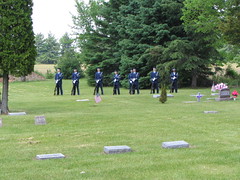Photos from Michael’s Tame the Web Minnesota tour on Flickr — tag ttwmn
Michael Stephens is here on day one of a 5-day tour of Minnesota. The room is packed with every type of library person, public, school, medical, board members
I’ll be posting all day high points.
His first “Hot” was “Rich User Experiences”
Barriers are sacred cows. Policies are born out of anxiety — anxiety that something may happen.
Commonalities of 2.0 Tools
- tagging
- commenting
- RSS feeds
- mash ups
Looking forward to the ILS that rolls tagging into their catalog (he thinks it will be SirsiDynix, because Steven Abrams gets it)
Blogging
27.2 million blogs (Technorati)
Great job going over basics of blogging
Have a mission or goal statement on the blog
Asked who is using various WYSIWYG (Dreamweaver, Front Page, HTML coding)
Great sympathy for the HTML coding (ugh, that’s me)
Biblioblogosophere — “wonderful word”, coined by Karen Schneider
edited 5/17 – typo in spelling, should be biblioblogosphere — thanks, Karen(sorry)
Library Blogs:
Topical Blogs
Book Reviews
User specific information (teen, seniors, book clubs)
Book club has a blog, do discussion through comments
Ancestor Research Blog
Singled out school librarians — said “Glad you’re here, it’s hard to get school librarians out”
Other types of blogs:
Project Blogs
Intranets
Association Blogs
Librarian Blogs
Transparency, example Urbana Public Library, progress on new library
Association Blogs
feelgoodlibrarian.typepad.com totally anonymous blog, librarian on the front lines
Why blog?
It works
It’s fast, easy & cheap
Internal: Communication for staff
External: Selling your message
Gorman? Cronin?
Question – how to measure effectiveness of blog. MS says, “ask me again in a year” Says he’s working on this. Measure
www.plymouth.edu/library/opac
Brand new site. Didn’t like Innovative OPAC. Developed own with overlaid WordPress (watch this closely)
Pulls in Amazon reviews, cover art
Released code to world.
Simply Put: Be Human
Talk to each other
Participate
Don’t hide
Successes & failures
Give the library a face
Took a break, gave some doorprizes! Shirts or “Perspectives” study
Podcasts:
Enhances library web presence
Time consuming
Limited methods of linking
Fascinating to see what comes next
What could they do:
Add podcasts to circulating podcasts
Podcast as training tool
Get clearance – permission from speakers, etc.
RSS
Dave Winer, defination “automated web surfing”
Train staff to use Bloglines — important to keep up
Cuts down on time to keep up on news
Aggregators:
PC: Amphetadesk, News Gator
Mac: NetNewsWire, iBlog
Web: Bloglines
Libraries can aggregate:
News
Local events
New book lists
Images
Assignments
Podcasts
With RSS Librarians can:
Keep in the know
Help your users find your stuff
Syndicate audio/video content about their library (podcasts & videocasts)
Question:
How can tools be free? Bloglines owned by ask (probably funded through them?)
Selling RSS:
Teach them
Promote feeds
Use them yourself
Be ready . . . it’s going to be big
Put your content out there where the library users are — through RSS
Instant Messaging Stats
Library using IM Reference, Michael says “Rock on”
At SJCPL did not get return on investment. Dropped VR. Replaced with IM
ask@sjcpl
Have a separate IM for audio visual
Want library to be on Buddy List
Make IM part of technology plan
Promote screen name
Admin should be messaging
Trian & encourage staff to interface via IM from desks
Add IM name to business cards, sig files, presence
Use multi-network IM program (trillian does all 3 — otherwise you need to have all 3 open at once)
Use away messages
Use online sources only if the best answer can be given from them
Don’t panic
Question from audience — value of IM weighed against cost of interruption, especially in small library with less staff (and no reference staff)
There was the phone
Then there was IM
Now the phone – (example) send text message to Google
Skype — “should this be available on our user PCs”
“should we be doing ‘skype-ref?'”
LUNCH
Wikis
“it’s a box, you type in it”
WorldCat wiki
Must register
The Wisdom of Crowds — more people are infinitely smarter
Harnessing the collective intelligence
ALA 2006 New Orleans
Welcome to the Blogging Libraries Wiki
pbwiki.com
Could design policy manual as a wiki
Media wiki, need a savvy person to do the install
Free — can do multiple wikis
Flickr
Photo-blogging
illustration, Rutland Free Library, Vermont
Michael Casey, Rock the Shelves: Band Night 2005
Creative Commons license — will share — use this, just give credit
Flickr – $25/year commercial license
Social Networking Sites
MySpace/Facebook (academia)
DOPA
See article by Dana Boyd — doing research
Second Life — “be aware . . . . a good place to visit”
Mashing up
Using APIs (Application Program Interface) to create new content
Many sites off
Google, Amazon
Example, mashup with Chicago libraries
Wall of books – Super Patron
Meeting the mission:
Mission & vision
fulfill goal or objective
best solution?
technology plan can guide innovation
Technology planning
Investigate & evaluate are good words
Mixture of admin & IT as well as front line staff — communicate about planning new services
lifespan of library tech plan: 1-2, not more than 5
12 Step Program for Technology Planning
1. Control your technolust
(beware technomust)
Techno-Divorce, let go of dead tech
Why are we doing this
#2. Plan for your users
user-centered planning
find new ways
involve users in planning from beginning
ask them what they want – don’t tell them what they need
OCLC’s Perceptions
meet the gamers
gaming tournaments at libraries
Beck on Gamers & Boomers
Create zones
Expand AV (circulate games)
Know each culture
Go global
Be a guide, not a boss
Personalize your Web services
Be attentive
Pew study: Millenials
team oriented,
immersed in media & gadgets
they use the Social web
Accept loss of privacy for accessibility
Their learning is shaped by technology & collaboration
Gamers learned to not fear failures
5 factors to consider (still in user)
2-1. Does it place a barrier between the user & the service
2-2. Is it librarian-centered or user-centered in conception
2-3. Does it add more rules to bulging book
2-4. Make more work for the user or the librarian?
2-5. Does it involve having to do damage control?
#3. Do your research first
#4. Communicate effectively
every step of the way, with staff, with users, involve all, listen
#5. Focus on the ROI
Value for users, you can tell this story
5 Steps for Implementation:
Create policy />Technology
Staffing
Training
Promotion
Revisit the plan often
designate point person
form committee
#6. Become a trendspotter
Read Blogs & use RSS feeds
Read professional journals
LITA Top trends
Read outside of field
LITA
Library Landscape
Retail expectations
#7. Create Staff Buy-In
7-1 Listen to the staff
7-2 Involve staff in planning
7-3 Tell stories (a picture’s worth a million words)
7-4 Be transparent, tell the staff what you’re doing (staff is suspicious of your motives)
7-5 Report and debrief
7-6 Manage meetings well (Death by Meeting – Patrick M. Lencioni, Getting Things Done by David Allen)
7-7 Let them play (DDR)
7-8 Celebrate successes
#8. Training
Librarian 2.0 understands value of training
delivered trainin in person, online, offsite
part of staff development
part of culture – up and down
well-trained staff can carry your message to your users
Important to train staff on Bloglines
The Sandbox — let them play
Why are we doing this? it’s how our young users meet the world
Emerging technology group
(Michael’s blog post for tech source “are you dreaming”)
Training 2.0 is about:
experience
play
success
failure
many different ways to get to the end result
Brenda Hough – “Training in a 2.0 World”
#9. Consider Content
It’s the future
Digital Creation Stations
Mashups and Remixes
Apple slogan – Do something. Say something. Make something.
“The Future of Music: Manifesto for the Digital Music Revolution”
Generation C (creates content)
Community, conversation, collaboration, connections, commons
#10. Embrace Change & Learn
We’ve always done it this way
There’s no time for that
Never stop learning
Challenge yourself
Breathe & take care of yourself
Cluetrain Manifesto.
Librarycrunch.com
ALA TechSource Blog
Librarian 2.0
Harnesses the social tools of Web 2.0
Understands the Long Tail – people have access to just about anything, long tail of interests
Uses the Wisdom of Crowds
If we don’t “get it” users will pass us by (use the tools)
But why?
You are discoverable
Go where users are
You utilize IM
Share with flickr
Collaborating
Use social networking tools to keep the staff informed.
Use a blog/wiki for planning or new projects
Offer training (RFID, WiFi)
Extend conversation
Reach out to patrons on their terms
Interact via new tools that don’t break budget
Remain relevant to those “born with the chip”
Keep a “No” log. Every time you say no in the library (from Librarygarden)
Creative catalysts
John Cage: “I don’t know why people are afraid of new ideas. I’m afraid of old ones.”
5 steps you can do now
Train staff to aggregate RSS
Create an Emerging Technology Committee
Involve your users
Use Web 2.0 Tools in the Sandbox
Learn from the gamers
Question answer – US is very behind on our bandwidth availability/and in infrastructure.


